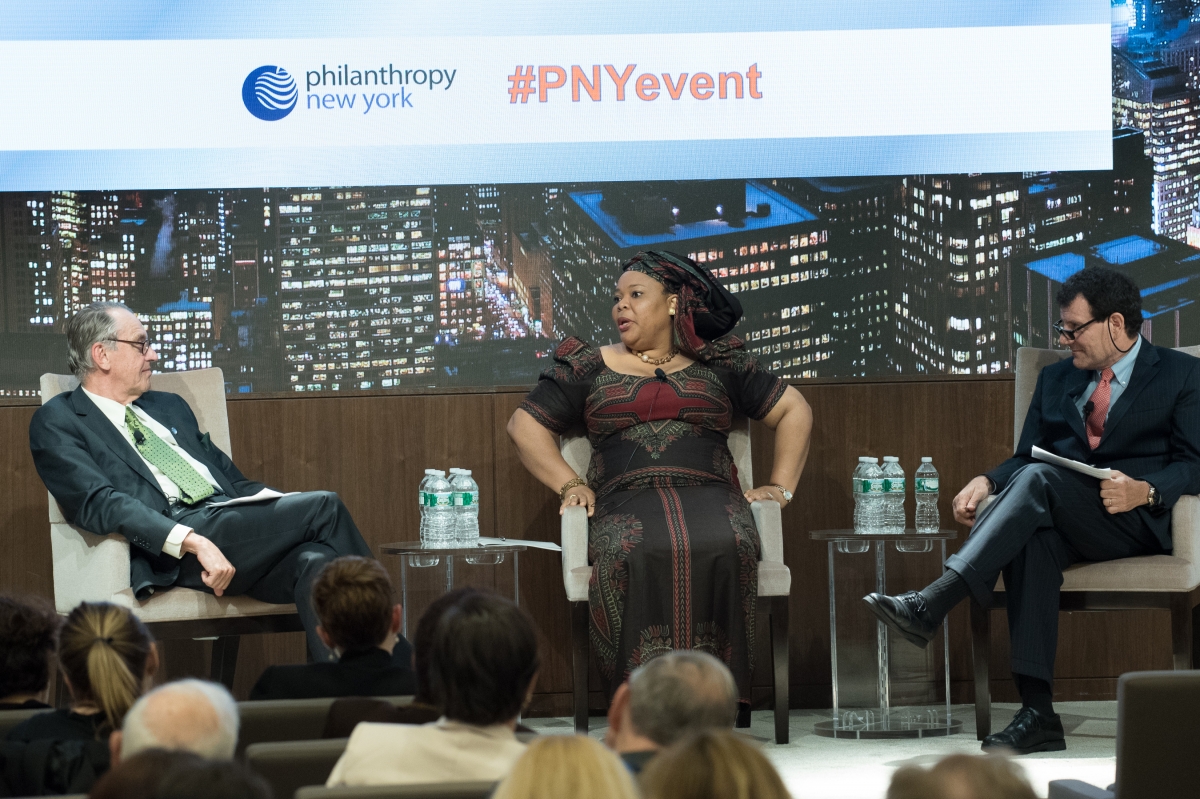At PNY Annual Meeting, Kristof Asks Gbowee and Eliasson “What Would You Do with $1B in Philanthropic Funds?”
Responses Highlight Differences Between Institutional and Grassroots Approaches

June 8, 2015
New York City - Philanthropy New York held its 36th Annual Meeting, hosted by J.P. Morgan Chase, focusing on international grantmaking, human rights and economic development worldwide. Speakers at the half-day conference called “Global Perspectives, Universal Connections” included Avila Kilmurray, Director, Policy & Strategy, Global Fund for Community Foundations, Johanna Satekge, Site Coordinator, Ramakgopa Clinic, mothers2mothers, Rana Sabbagh, Executive Director, Arab Reporters for Investigative Journalism, Jan Eliasson, Deputy Secretary-General, United Nations, Leymah Gbowee, 2011 Nobel Peace Laureate and President, Gbowee Peace Foundation Africa and Nicholas Kristof, Columnist, The New York Times.
In his opening comments to Philanthropy New York members, Eliasson talked about a range of issues that are priorities for international institutions like the United Nations, but emphasized, “We can’t do it alone. Nobody can do it alone. Nobody can do everything but everyone can do something… The new sustainable development goals that we negotiate can never be done if we don’t have the corporate sector, the philanthropic sector, the scientific community. Then we can get things done.” Throughout his remarks and in conversation with Kristof and Gbowee, he repeatedly emphasized the need to focus on providing developing nations with clean, safe potable water.
By contrast, Gbowee said that large institutions, including philanthropy, too often operate with a hand covering one eye – only seeing part of the picture. Over the course of the conversation, Gbowee pointed to the frequency with which funders change direction and respond to the crisis of the moment rather than dedicating themselves to long-term solutions and taking the time to deeply understand the desires of the communities that are the best partners in charting a path to progress. When asked by Kristof how she would use $1 billion in philanthropic funds, she said, “I would dance for a week, because I could just imaging all of the tiny, but really substantial projects I could put it into. I would focus on girls’ education, maternal health, youth empowerment and employment… I could do a lot, and can go on saying, but then the temptation is I would end up being like a lot of those I just talked about, too little focus and not [accomplishing] any specific thing.” Gbowee consistently criticized philanthropy’s over-emphasis on measurable outcomes at the expense of learning the intricacies of complex relationships within communities to avoid unintended consequences. In Kristof’s probing conversation, Eliasson and Gbowee talked about the role of philanthropy in addressing armed conflicts in places like Syria and South Sudan, taking projects to scale when they seem to be working, avoiding “feel-good philanthropy,” and not letting philanthropic investments give governments an excuse to let up from their own obligations domestically and internationally.
The provocative conversation among Kristof, Eliasson and Gbowee was preceded by “PHIL Talks” – a set of rapid-fire presentations by three fascinating leaders. After PHIL Talks presenters Kilmurray, Satekge and Sabbagh gave their talks, they sat down with Ford Foundation President Darren Walker, who found common themes and contrasting ideas among the three women who had vastly different life experiences.
These rapid-fire presentations covered topics like women's rights, community development, human rights, foreign policy, pediatric health and workforce development.
PHIL TALKS
Advance through the video for key moments:
- 00:02 Ronna Brown, President, Philanthropy New York introduces Moderator
- 02:22 Darren Walker, President Ford Foundation, introduces the “PHIL Talks” session.
- 04:23 PHIL Talk: Avila Kilmurray, Director, Policy & Strategy, Global Fund for Community Foundations
- 14:22 PHIL Talk: Johanna Satekge, Site Coordinator, Ramakgopa Clinic, mothers2mothers
- 28:48 PHIL Talk: Rana Sabbagh, Executive Director, Arab Reporters for Investigative Journalism
- 41:21 Panel Discussion with moderator and our three PHIL Talkers
The Annual Meeting concluded with the keynote panel. This discussion included an examination of the sector's role in other countries, creating coalitions to spur change and the importance of focusing on action and not just relying on numbers and metrics.
HEADLINE PANEL
Advance through the video for key moments:
- 00:01 Ronna Brown introduces Monica Issar, Global Head of Endowments & Foundations, JPMorgan Global Wealth Management
- 02:38 Ronna Brown introduces Jan Eliasson, Leymah Gbowee and Nicholas Kristof 07:18 Jan Eliasson, Deputy Secretary-General, United Nations
- 15:10 Leymah Gbowee, 2011 Nobel Peace Laureate and President, Gbowee Peace Foundation Africa 22:25 Conversation with Eliasson, Gbowee and Kristof
- 23:30 “What is philanthropy’s Role in Syria/South Sudan?”
- 27:17 “Is philanthropy’s emphasis on metrics and scalability misplaced?”
- 38:38 “There’s a lot of feel-good in philanthropy nowadays…A lot of people feel bad about something, so then they just go and give something to somebody.”
- 58:23 “What would you do with a billion dollars?” (Gbowee)
- 100:00 “What would you do with a billion dollars?” (Eliasson)
- 103:14 “Is there a risk that we’re letting governments off the hook if private philanthropy is funding things that governments should be funding?
PHOTO SLIDESHOW
See who was there and how your colleagues interacted with these leaders!
RESOURCES
- Check out our Annual Meeting Program for an outline of the day's events and detailed speaker bios.
- Click here to learn more about the International Grantmakers Network and how you can get involved.
STORIFY
We invite you to experience (or re-experience) the Philanthropy New York 36th Annual Meeting with our Storify collection of Tweets.
Thank you to our official "Tweet Team" and everyone who helped keep the conversation going on Twitter: Deborah Burke (Rockefeller Brothers Fund), Bianca Constance (SIFMA Foundation), Olga Ginzburg (Renova), Christine Haran (The Commonwealth Fund), Jaclyn Le (Wallace Foundation), Dara Major (Dara Major Consulting), Lenore Neier (William T. Grant Foundation), Rachel Pardoe (The New York Community Trust), Vivienne Peng (The New York Women’s Foundation), Maria Rohani (Arabella Advisors)
